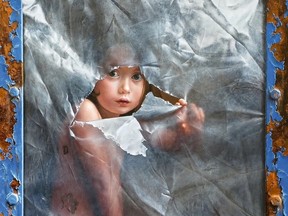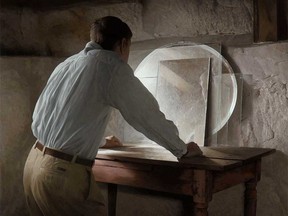Pellerin: Portrait of a country — a new book captures these faces
The Kingston Prize celebrates 20 years of looking into our collective soul.

Article content
Sometimes the best way to get to know who you are is to look in a mirror. Or at a portrait. The Kingston Prize, created in the Eastern Ontario city by husband and wife Kaaren and Julian Brown 20 years ago, offers a beautiful and collective way to do just that.
Jason Donville co-chairs the Kingston Prize and is passionate about making every Canadian aware of it. It is inspired by Australia’s Archibald Prize, and it offers $25,000 to the winner, chosen by an independent jury, among entries by Canadian artists depicting Canadians in portraits based on real-life encounters.
The book published to celebrate the first two decades of the prize shows how portraits capture the essence and evolution of who we are as a country. (You can find the images contained in the book on the Kingston Prize website under “Exhibitions,” which is a nice way to make art widely accessible.)
Tthe most beautiful part? We all bring our experiences and sensibilities to how we look at those gorgeous portraits and see ourselves reflected in them.
What’s interesting and special about the Kingston Prize, Donville explains, is that historically Canada has defined its artistic excellence through landscape, and not just because of the Group of Seven. “We were a young country that didn’t really know what we were about,” he says, “so we’ve gone to the land as a way to express ourselves.”
And for sure we have spectacular landscapes. “But the face of Canada is an important part of who we are and our identity,” he adds. One that is complex, diverse and sometimes a little challenging.

Looking at those portraits, I can’t stop myself from imagining their stories. Families, soldiers, people who appear lonely, others whose hardship I can feel jumping off the page at me. Like the 2007 winner, Emily, by Etobicoke-based painter Joshua Choi. She is sitting on a simple chair, with no background to speak of. Everything is in her tired eyes and heavy lower lip. She seems so exhausted. What could have caused her to be this way?
At the other end of the happiness spectrum, I found joy looking at Brian Michon’s Lloyd and Elsie from 2009, and I was inspired by the defiance in Ian Stone’s Moon-kissed from 2023.
I appreciate that the stories I imagine about the subjects of those portraits aren’t obvious in the paintings. Anyone looking at this book would find other portraits striking and see some of their own stories reflected at them. That is the magic of art: every single person receiving it has their own way of interpreting it. There is no right or wrong way to appreciate a painting.
If someone were to ask who we are as a country, Donville says he would simply hand them the book “and then shut up and say, ‘this is who we are.’ I think it’s a really good representation of how beautiful we are, how diverse we are. All the things that are really wonderful about this country are in that book. And you don’t need to talk. The paintings do the talking.”
The prize typically gets around 400 entries, although Donville would be pleased to see more, noting the Archibald Prize in Australia can get more than 1,000, from a smaller population.
In its 20 years of existence, the Kingston Prize has recognized extraordinary artists from every corner of Canada, including finalists from Ottawa and the Ottawa Valley. Perhaps because one of the rules stipulates that portraits be based on real-life encounters, the paintings it has recognized since 2005 constitute one of the most diverse collections I have ever seen: geographically, demographically and socio-economically. It truly reflects the country, from the most vulnerable to the boastful, amused, thoughtful and intense.
We need mirrors to show us who we are. I’m glad the Kingston Prize exists, and I wish it all the success it deserves.
Brigitte Pellerin (they/them) is an Ottawa writer.














Postmedia is committed to maintaining a lively but civil forum for discussion. Please keep comments relevant and respectful. Comments may take up to an hour to appear on the site. You will receive an email if there is a reply to your comment, an update to a thread you follow or if a user you follow comments. Visit our Community Guidelines for more information.